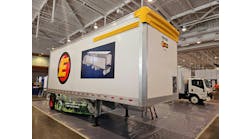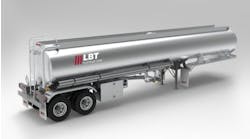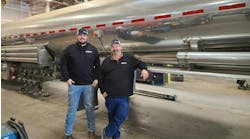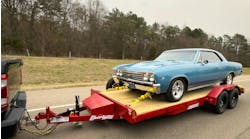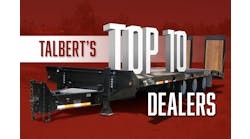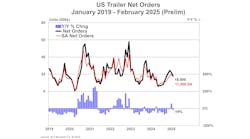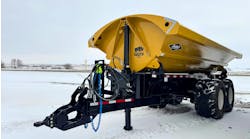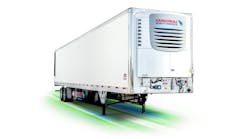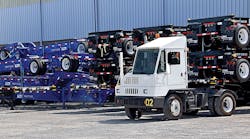A tariff exclusion request for intermodal chassis from China has been welcomed by U.S. fleets and leasing companies, but the request is pitting some US trailer manufacturers against the biggest chassis builder in the industry.
The Section 301 exclusion request by the American Trucking Associations was posted August 15, and the comment period closed August 29.
“At the request of motor carrier members that buy chassis, ATA filed the exclusion,” ATA Chief Economist & Senior Vice President of International Trade Policy & Cross-Border Operations Bob Costello tells Trailer/Body BUILDERS. “Those carriers were concerned that, in the near term, there is not enough US chassis production or capacity to meet their demand.”
Indeed, the ATA filing with the US Trade Representative details the grounds for the request: In 2018, the demand for chassis in the United States ranged between 53,000 and nearly 55,000 units, while US manufacturers were able to satisfy less than 10% of that demand, according to the analysis drawn from industry data, including the annual Trailer Output Report by TBB.
Some 43,000 chassis for the US market came from CIMC Intermodal Equipment, the US arm of China International Marine Containers Group Ltd., the largest shipping equipment supplier in the world. Many CIMC-IE chassis models are completed in China and shipped directly to US customers, while other models are assembled in the US from kits shipped from China. All are subject to a 25% percent tariff set to rise to 30% in October.
ATA also points out that the only other imported chassis sold in the US come from Mexico, where Hyundai Translead built 6,621 units in 2018.
“While many companies actively try to source from US and third country producers, there simply is not enough supply from these sources to meet the large and growing demand in the United States,” the ATA request states, noting that a typical order is 1,000 to 2,000 trailers for a volume discount. “U.S. chassis manufacturers simply do not have the capacity to accommodate such large quantities in the timeframe demanded by the industry.”
The filing adds that while CIMC IE can fill large orders in 1 to 2 months, domestic manufacturers “typically” require 6 to 12 months.
In June, ATA used similar arguments in asking that 53-foot domestic intermodal containers be excluded from the tariffs on Chinese goods. USTR granted that request August 15.
Based on public responses filed with USTR, the ATA chassis request is supported by leasing companies such as Flexi-Van Leasing, which states that while the company buys “a substantial number” of chassis from US manufacturers, the domestic suppliers offer “nowhere near the sufficient manufacturing capacity” to meet present and future demand. Additionally, the tariff means Flexi-Van “would be buying four chassis but paying for five.”
Leasing giants Direct ChassisLink Inc. (DCLI) and TRAC Intermodal, along with the trade association Institute of International Container Lessors LTD, also filed responses in support of the exclusion.
'Red herring'
Domestic manufacturers, however, argue ATA’s analysis of the data is misleading: US suppliers had significant chassis capacity that sat idle in 2018 due to a “glut” of trailers from China, imported to get ahead of the tariff charges—and those units, with a short lead time for delivery, made for more attractive replies to bid requests.
“There is sufficient capacity in the domestic market to satisfy demand for chassis in the United States,” writes Truck Trailer Manufacturer Association President Jeff Sims in the organization’s response opposing the exclusion. “Chinese manufacturers like CIMC ramped up production and imported additional chassis far beyond demand levels to ensure that their imported products would not be subject to the higher tariff. This ‘import surge’ has been widely reported and recognized in the trade community as a whole.
“U.S. manufacturers have been undercut by Chinese manufacturers in price and therefore were not given the opportunity to satisfy the full demand. If given the opportunity in a fairly traded market, TTMA members would likely be able to meet the full demand in the market.”
Sample data from five TTMA members indicates that those members currently have the capacity to produce 39,000 chassis per year, and other TTMA members have additional capacity available that can be brought back online quickly if “fairly traded” orders were available, the association contends. If given the opportunity, those same five TTMA members could ramp up annual production to 43,000 chassis within six months and to 68,000 chassis within 12 months.
TTMA also takes issue with the ATA claim that chassis with certain dimensions can only be sourced from China, again arguing that “in a fairly traded market” US manufacturers can meet that demand.
“There is nothing special or unique about the Chinese chassis other than their unfairly low prices,” Sims concludes.
US manufacturers Stoughton Trailers and Cheetah Chassis Corporation also filed responses in opposition to the ATA request (available at the respective links).
“The claim that US manufacturers cannot meet customers' delivery requirements is a red herring, and we urge the USTR not to fall for it,” writes Stoughton President and CEO Bob Wahlin. “Granting the request of the ATA for exclusion of container chassis would be tantamount to rewarding our Chinese competitors for achieving the precise results the tariffs are designed to address: protecting American manufacturers from the unfair advantages enjoyed by our Chinese competitors by establishing a more fair and even playing field in which to sell their products.”
Cheetah Chassis, likewise, says the ATA request is “akin to blaming the victim” after years of unfair Chinese trade practices which have “nearly killed the domestic container chassis industry.” The filing also notes that USTR has already considered the issues addressed by ATA during briefings on the tariff ahead of the initial 2018 action—and determined then that the tariffs should be imposed.
“The ATA is merely attempting to have USTR reconsider the same decision, which is wholly inappropriate,” the Cheetah response says.
But CIMC IE President and CEO Frank Sonzala, in a statement for Trailer/Body BUILDERS, insists that his is “an AMERICAN company, with Americans employed in two facilities in the USA.”
“Many other Americans are employed in our dealers' distribution networks and also many more Americans employed by trucking companies, logistics companies, leasing companies and American chassis pools and ports,” Sonzala says. “The ATA clearly submitted on behalf of the trucking industry. We entirely agree with the ATA submission for exclusion of the tariffs on chassis.
“There is a major need for new chassis and that demand is not being fulfilled due to the 25% and soon to be 30% tariff. The damage to the entire trucking industry is affecting all Americans in the business.”
